1 Samuel 11 meaning explained in AI Summary
This chapter marks a turning point in the book, showcasing Saul's leadership and solidifying his kingship.
The Ammonite Threat:
- Nahash, the Ammonite king, besieges Jabesh Gilead, a city east of the Jordan River.
- He offers cruel surrender terms: each man would have his right eye gouged out, bringing shame upon Israel.
- The men of Jabesh Gilead plead for a seven-day grace period to seek help from other Israelite tribes.
Saul's Rise to Action:
- Messengers from Jabesh Gilead reach Saul's hometown, Gibeah.
- Filled with the Spirit of God, Saul takes drastic action:
- He slaughters a yoke of oxen and sends the pieces throughout Israel, threatening a similar fate to any who don't join the fight.
- This powerful message galvanizes the Israelites, and a massive army of 330,000 men assembles.
A Decisive Victory:
- Saul divides his army into three divisions and launches a surprise attack on the Ammonites.
- The Israelites achieve a resounding victory, scattering the Ammonite army and rescuing Jabesh Gilead.
Saul's Kingship Confirmed:
- After the victory, some Israelites suggest executing those who initially doubted Saul's leadership.
- However, Saul displays mercy and forbids any bloodshed, demonstrating his humility and focus on unity.
- The people then travel to Gilgal, where they renew the kingship over Saul in a joyous ceremony.
Key Themes:
- God's Empowerment: The Spirit of God empowers Saul to act decisively and courageously.
- Unity and Leadership: Saul unites the fractured tribes of Israel, demonstrating his leadership qualities.
- Mercy and Forgiveness: Saul's refusal to punish his doubters highlights his humility and desire for unity.
This chapter establishes Saul as a powerful and capable leader, chosen by God and accepted by the people. It sets the stage for the next phase of his reign, filled with both triumphs and challenges.
1 Samuel 11 bible study ai commentary
This chapter marks the public validation of Saul's kingship. Faced with a national crisis—the brutal threat of the Ammonites against Jabesh-gilead—Saul moves from being a private citizen to a decisive, Spirit-empowered leader. He rallies a fragmented Israel through a dramatic call to arms, secures a swift and total victory, and demonstrates magnanimity towards his former detractors. This event solidifies his divine appointment, uniting the people under his rule and formally inaugurating the monarchy at Gilgal with a celebration of God's salvation.
1 Samuel 11 Context
The Israelites exist as a loose confederation of tribes, vulnerable to foreign powers like the Ammonites, a perennial enemy from the east. Following the people's demand for a king "like all the nations," Saul has been chosen by God and anointed by Samuel, but his kingship is not yet universally accepted (1 Sam 10:27). The nation is at a fragile transition point between the era of charismatic judges and a centralized monarchy. This chapter provides the critical test that proves Saul's fitness to rule and unifies the nation behind him. The people of Jabesh-gilead, while Israelites, had a checkered history, notably their failure to join Israel against the tribe of Benjamin (Judges 21), an event which ironically led to Benjaminite men (Saul's tribe) taking wives from them.
1 Samuel 11:1-3
Then Nahash the Ammonite came up and besieged Jabesh-gilead, and all the men of Jabesh said to Nahash, “Make a treaty with us, and we will serve you.” But Nahash the Ammonite said to them, “On this condition I will make a treaty with you, that I gouge out all your right eyes, and thus bring disgrace on all Israel.” And the elders of Jabesh said to him, “Give us seven days' respite that we may send messengers through all the territory of Israel. Then, if there is no one to save us, we will give ourselves up to you.”
In-depth-analysis
- Nahash the Ammonite: The name Nahash (נָחָשׁ) means "serpent." This immediately casts him as a sinister, archetypal enemy, reminiscent of the serpent in Genesis 3. The Ammonites had previously oppressed Israel and were defeated by Jephthah (Judges 10-11).
- Jabesh-gilead: A town east of the Jordan River. Their willingness to "serve" a foreign power highlights the desperation and political weakness of the tribal system, which was the very reason Israel demanded a king (1 Sam 8:5, 20).
- Gouge out all your right eyes: This was a tactic of extreme humiliation and military neutralization. It would bring "disgrace on all Israel," showing that no one could protect them. For an archer, who typically aimed with the right eye, this injury meant the end of his military career.
- Seven days' respite: A seemingly generous offer, but it was rooted in Nahash's arrogance. He was confident that the disunified tribes of Israel were incapable of mounting a rescue, making their inevitable failure even more shameful.
Bible references
- Judges 11:12-13: '...Thus says the king of the Ammonites, “Because Israel on coming from Egypt took away my land...”' (Historical basis for Ammonite hostility).
- Judges 21:8-10: 'And they said, “What one is there of the tribes of Israel that came not up...to the LORD?”...“For no man had come to the camp from Jabesh-gilead.”' (Past link between Jabesh-gilead and the rest of Israel, especially Benjamin).
- Proverbs 12:10: 'Whoever is righteous has regard for the life of his beast, but the mercy of the wicked is cruel.' (Nahash's cruelty reflects a wicked heart).
Cross references
Jer 13:23 (leopard's spots), Num 23:24 (nation like a lion), Deut 23:3-4 (Ammonites barred from assembly), Prov 27:1 (don't boast about tomorrow), 2 Kings 25:7 (Zedekiah's sons killed & eyes put out).
Polemics
Scholars note that Nahash's demand was not just cruelty for cruelty's sake. It was a calculated psychological and military strategy. By removing the right eye, he would render their soldiers useless in archery and bring an unforgettable reproach, a visible symbol of Israel's weakness and the impotence of their God. His goal was not just conquest but a statement of dominance over Israel and Yahweh.
1 Samuel 11:4-5
When the messengers came to Gibeah of Saul, they reported the news in the hearing of the people, and all the people wept aloud. Now, behold, Saul was coming from the field behind the oxen. And Saul said, “What is wrong with the people, that they weep?” So they told him the news of the men of Jabesh.
In-depth-analysis
- Gibeah of Saul: Saul's hometown. The messengers came here because he had been designated as the potential leader, even if not fully recognized.
- People wept aloud: Their reaction is one of helplessness and despair. They see the disgrace on Jabesh as their own but feel powerless to act, embodying the failure of the pre-monarchic system.
- Saul was coming from the field behind the oxen: This detail is critical. Despite being anointed king (1 Sam 10:1), Saul has returned to his simple, agricultural life. He is not in a palace surrounded by an army, but a common farmer. This humility contrasts with the arrogant kings of other nations and highlights that his power will come from God, not from a royal station. This is a Cincinnatus-like figure, called from the plow to save his people.
Bible references
- 1 Sam 10:26-27: '...But some worthless fellows said, “How can this man save us?” And they despised him and brought him no present. But he held his peace.' (Shows the contested nature of Saul's kingship prior to this event).
- Judges 6:11: '...Gideon was beating out wheat in the winepress to hide it from the Midianites.' (Another humble farm setting for the call of a deliverer).
- Amos 7:14-15: 'Then Amos answered... “I was no prophet, nor a prophet's son, but I was a herdsman...and the LORD took me from following the flock...”' (God often calls leaders from humble work).
Cross references
1 Sam 9:1 (Saul's background), 1 Kings 19:19-21 (Elisha plowing with oxen), Luke 2:8 (shepherds in the field), Exod 3:1 (Moses tending flocks).
1 Samuel 11:6-8
And the Spirit of God rushed upon Saul when he heard these words, and his anger was greatly kindled. He took a pair of oxen and cut them in pieces and sent them throughout all the territory of Israel by messengers, saying, “Whoever does not come out after Saul and Samuel, so shall it be done to his oxen!” Then the dread of the LORD fell upon the people, and they came out as one man. When he mustered them at Bezek, the people of Israel were 300,000, and the men of Judah 30,000.
In-depth-analysis
- Spirit of God rushed upon Saul: The Hebrew verb tsalach (צָלַח) implies a powerful, transformative empowering. This is the same Spirit that came upon judges like Othniel, Gideon, and Samson. Saul's subsequent actions are not of his own flesh but are divinely inspired.
- Anger was greatly kindled: This is righteous indignation, not sinful rage. It is a reflection of God's own anger against injustice, cruelty, and threats against His people.
- Cut them in pieces: This shocking act serves as a visceral, unforgettable summons. It graphically illustrates the consequence of inaction. This act repurposed the horrific symbol from Judges 19, turning a sign of tribal fragmentation and atrocity into a summons for national unity and holy war.
- After Saul and Samuel: Saul wisely includes Samuel's name, leveraging the prophet's established authority to bolster his own new leadership. It shows submission to the prophetic office.
- Dread of the LORD: It was not just fear of Saul, but a divinely instilled sense that this call was from God Himself. This is what unified them "as one man," overcoming the tribal divisions.
- 300,000... 30,000: The separate counting of Israel and Judah is a subtle but significant detail, foreshadowing the eventual split of the kingdom.
Bible references
- Judges 14:6: 'Then the Spirit of the LORD rushed upon him [Samson], and although he had nothing in his hand, he tore the lion in pieces...' (Same language of the Spirit "rushing upon" a deliverer).
- Judges 19:29: 'And when he entered his house, he took a knife, and taking hold of his concubine, he divided her, limb by limb, into twelve pieces and sent her throughout all the territory of Israel.' (The horrifying precedent that Saul redeems for a righteous cause).
- Numbers 1:3: 'from twenty years old and upward, all in Israel who are able to go to war, you and Aaron shall list them...' (The tradition of mustering Israel for war).
Cross references
1 Sam 10:10 (Spirit on Saul), Judg 3:10 (Spirit on Othniel), Neh 4:14 (fight for your families), 2 Chron 20:29 (fear of God on kingdoms).
1 Samuel 11:9-11
And they said to the messengers who had come, “Thus shall you say to the men of Jabesh-gilead: ‘Tomorrow, by the time the sun is hot, you shall have salvation.’” When the messengers came and told the men of Jabesh, they were glad. And the men of Jabesh said to the Ammonites, “Tomorrow we will give ourselves up to you, and you may do to us whatever seems good to you.” And the next day Saul put the people in three companies. And they came into the midst of the camp in the morning watch and struck down the Ammonites until the heat of the day. And those who survived were scattered, so that no two of them were left together.
In-depth-analysis
- Tomorrow... salvation: The promise is specific and faith-filled. The Hebrew word for salvation, teshu'ah (תְּשׁוּעָה), means deliverance or victory. Saul is promising divine intervention.
- Tomorrow we will give ourselves up: A clever deception by the men of Jabesh to ensure the Ammonites would be unsuspecting and unprepared for the dawn attack.
- Three companies: This tactic of dividing forces to attack from multiple directions at dawn mirrors Gideon's successful strategy against the Midianites, another celebrated victory of a smaller force against a larger one.
- Morning watch: The final watch before dawn (approx. 2-6 AM), when the enemy would be least expecting an attack after a night's siege.
- No two of them were left together: An idiomatic expression for a total, crushing rout. The enemy was not just defeated but completely disorganized and scattered, emphasizing the totality of God's victory through Saul.
Bible references
- Judges 7:16, 19: 'And he divided the three hundred men into three companies... at the beginning of the middle watch...' (Gideon's almost identical military strategy).
- Exodus 14:24: 'And in the morning watch the LORD in the pillar of fire and of cloud looked down on the Egyptian forces and threw the Egyptian forces into a panic.' (God fighting for Israel in the morning watch).
- Joshua 10:9: 'So Joshua came upon them suddenly, having marched all night from Gilgal.' (Precedent for a swift, all-night march to achieve surprise).
Cross references
Exod 14:13 ("stand still, and see the salvation"), Ps 18:37-38 (pursuing and destroying enemies), Josh 11:8 (left none remaining), 2 Kings 7:5-7 (Aramean camp scattered in panic).
1 Samuel 11:12-13
Then the people said to Samuel, “Who is it that said, ‘Shall Saul reign over us?’ Bring the men, that we may put them to death.” But Saul said, “Not a man shall be put to death this day, for today the LORD has worked salvation in Israel.”
In-depth-analysis
- Who is it that said...? The people, fresh from victory and united behind Saul, now want to purge the dissenters mentioned in 10:27. This is a common reaction after a leader is vindicated.
- But Saul said...: Saul’s response demonstrates remarkable character and leadership. At his moment of greatest triumph, he chooses mercy over vengeance.
- Today the LORD has worked salvation: Saul gives all credit to God. He deflects personal glory and points to Yahweh as the true deliverer. By doing so, he frames the execution of fellow Israelites as an inappropriate response to a day of divine grace. He prevents a civil purge and further unifies the nation.
Bible references
- 1 Samuel 10:27: 'But some worthless fellows said, “How can this man save us?”' (The specific dissenters the people now want to punish).
- 2 Samuel 19:22: 'But David said... “Shall anyone be put to death in Israel this day? For do I not know that I am this day king over Israel?”' (King David shows identical magnanimity to Shimei after Absalom's rebellion).
- Luke 9:54-55: 'And when his disciples James and John saw it, they said, “Lord, do you want us to command fire to come down from heaven and consume them?” But he turned and rebuked them.' (A New Testament parallel of rejecting vengeful "justice").
Cross references
Prov 19:11 (glorious to overlook an offense), Micah 7:18 (God delights in mercy), Rom 12:19 ("Vengeance is mine, I will repay," says the Lord).
1 Samuel 11:14-15
Then Samuel said to the people, “Come, let us go to Gilgal and there renew the kingdom.” So all the people went to Gilgal, and there they made Saul king before the LORD in Gilgal. There they sacrificed peace offerings before the LORD, and there Saul and all the men of Israel rejoiced greatly.
In-depth-analysis
- Gilgal: A place of immense historical and spiritual significance. It was Israel's first campsite in the Promised Land (Josh 4:19), where the "reproach of Egypt" was rolled away (Josh 5:9), and where the covenant was renewed. Samuel also held court there (1 Sam 7:16). Holding the coronation here connects the new monarchy to Israel's foundational salvation history.
- Renew the kingdom: Saul was already chosen by lot and anointed privately. This event is the public acclamation and ratification of his rule based on his proven, God-given ability to lead and save.
- Made Saul king before the LORD: The kingship is established under God's authority, not as a purely secular institution. This ceremony solidifies the theocratic nature of Israel's monarchy.
- Peace offerings: These sacrifices symbolized fellowship, peace, and restored communion between God and the people, and among the people themselves. It was a celebratory meal of national unity.
Bible references
- Joshua 5:9: 'And the LORD said to Joshua, “Today I have rolled away the reproach of Egypt from you.” And so the name of that place is called Gilgal to this day.' (The spiritual significance of the location).
- 1 Samuel 10:8: 'And you shall go down before me to Gilgal...' (Fulfillment of Samuel's prior instruction, though the context here is different from the later command in chapter 13).
- 1 Chronicles 12:38: 'All these, men of war, arrayed in battle order, came to Hebron with a whole heart to make David king over all Israel.' (A similar public confirmation of a king).
Cross references
Lev 3:1 (peace offerings), 1 Sam 7:16 (Samuel's circuit included Gilgal), Deut 27:6-7 (building an altar and making peace offerings), 1 Kings 1:39-40 (celebration at Solomon's anointing).
1 Samuel Chapter 11 analysis
- From Judge to King: Saul's actions in this chapter bridge the gap between the era of Judges and the Monarchy. He is empowered by the Spirit and rallies the tribes like a classic Judge (Gideon, Samson) but the outcome is the institutionalization of his kingship, not just a temporary deliverance.
- Kinship and Obligation: The story from Judges 21, where the tribe of Benjamin (Saul's tribe) was saved from extinction by wives from Jabesh-gilead, adds a layer of familial debt. Saul is not just saving fellow Israelites; he is rescuing the very people who saved his tribe from oblivion, adding a powerful, unspoken motivation for his actions.
- The "Serpent" (Nahash) and the Deliverer (Saul): The story can be read allegorically. The "Serpent" comes to bring disgrace and bondage. A deliverer, empowered by God's Spirit, arises from a humble state (from the field) to crush the serpent's head, bringing teshu'ah (salvation/victory). This presents a "proto-Gospel" narrative arc, a foreshadowing of the ultimate battle between the Seed of the woman and the Serpent (Gen 3:15).
- The Ideal King: This chapter presents the "honeymoon" phase of the monarchy, outlining the ideal characteristics of an Israelite king: Spirit-led, humble in origin, filled with righteous anger against evil, decisive in action, unifying, merciful to internal enemies, and giving all glory to God. This portrait provides a tragic contrast to Saul's later failures in chapters 13 and 15.
1 Samuel 11 summary
Nahash the Ammonite besieges Jabesh-gilead, offering a humiliating treaty to gouge out the right eye of every man. When news reaches Saul, the Spirit of God rushes upon him. He summons Israel to war with a dramatic threat, musters a massive army, and executes a surprise dawn attack, annihilating the Ammonites. Following this decisive victory, Saul shows mercy to his detractors and refuses to punish them. In response to his confirmed leadership, Samuel leads the people to Gilgal, where they joyfully renew Saul's kingship before the Lord.
1 Samuel 11 AI Image Audio and Video
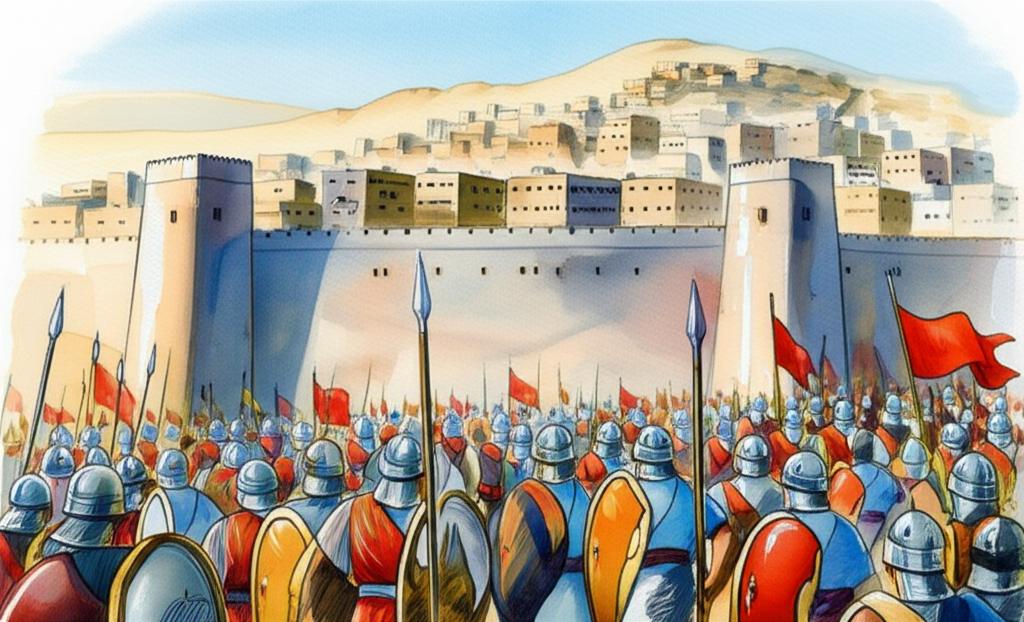
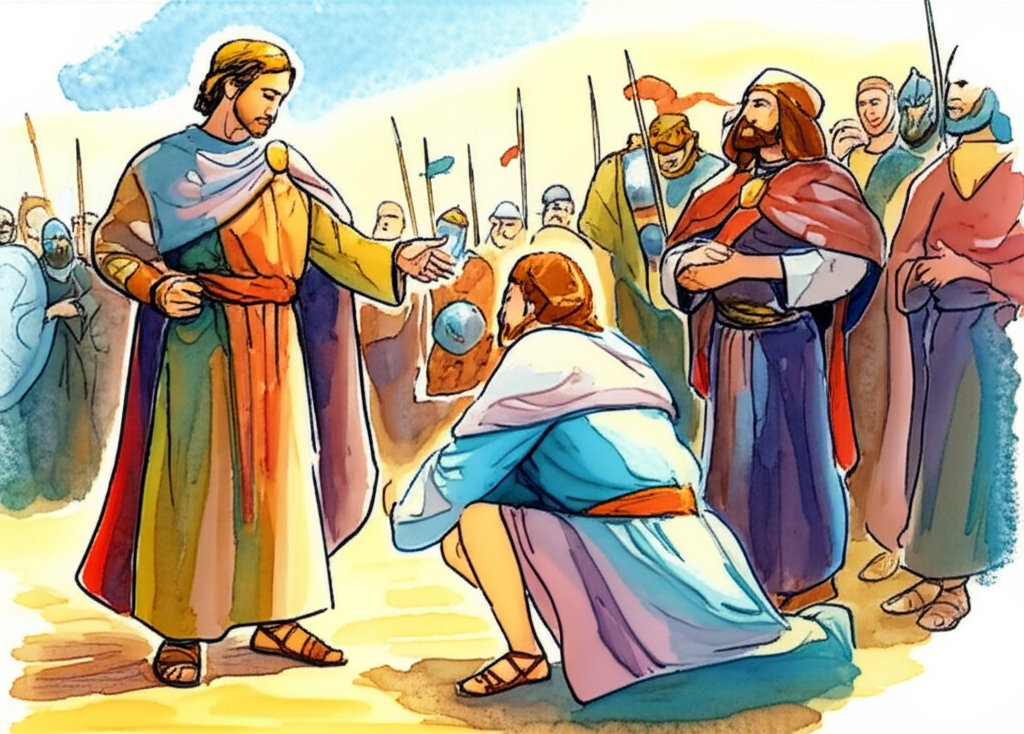
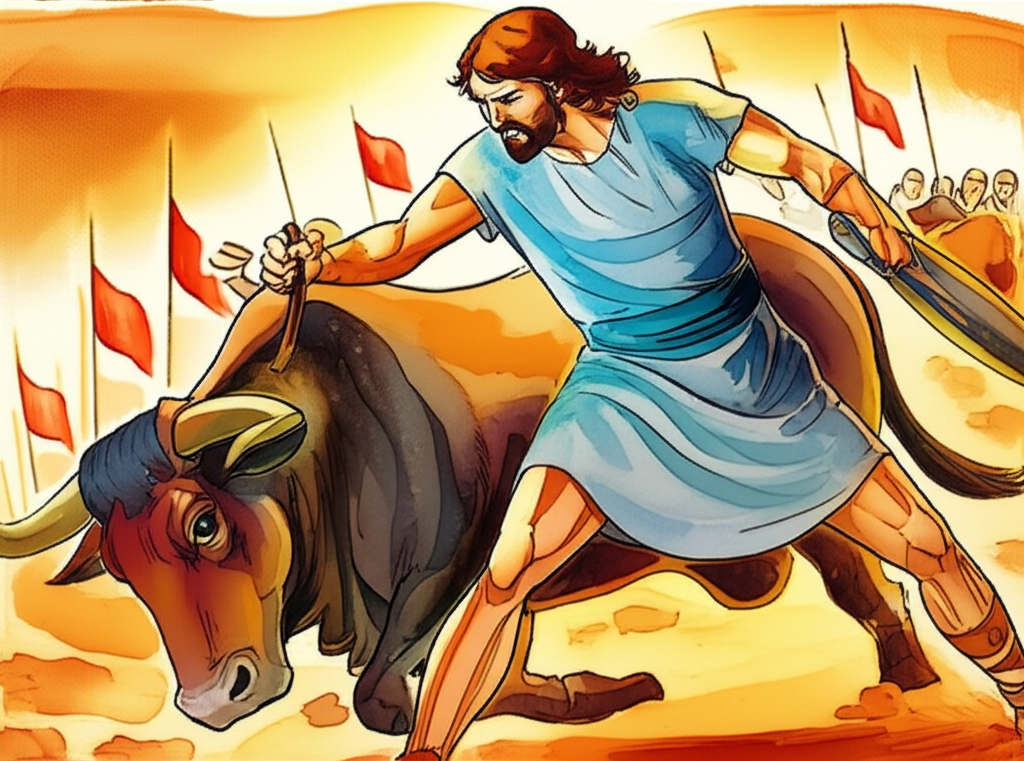
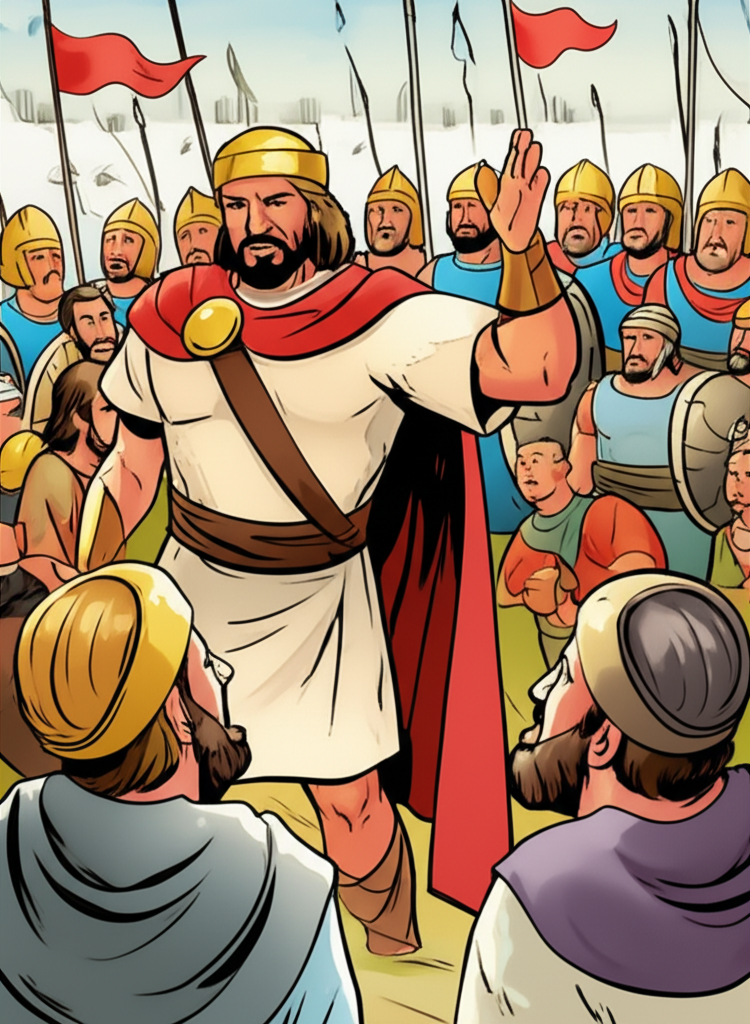
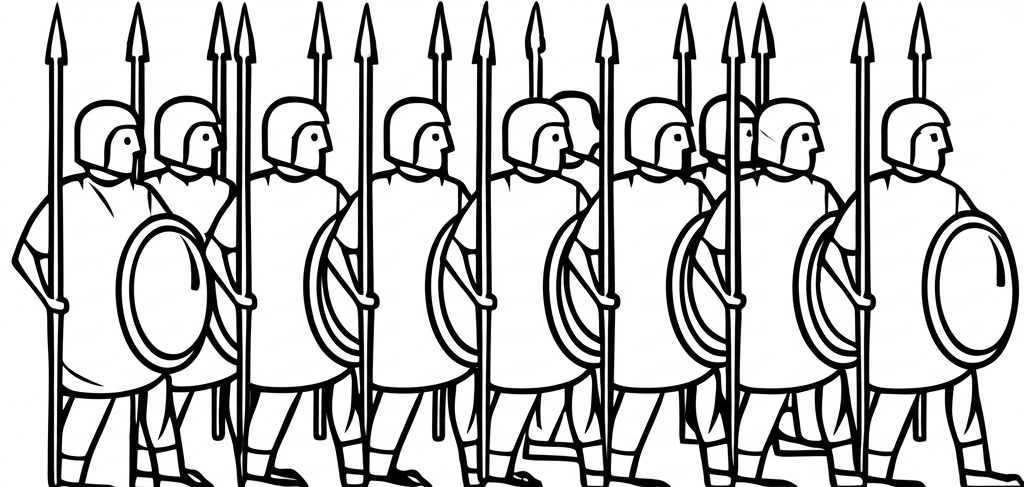
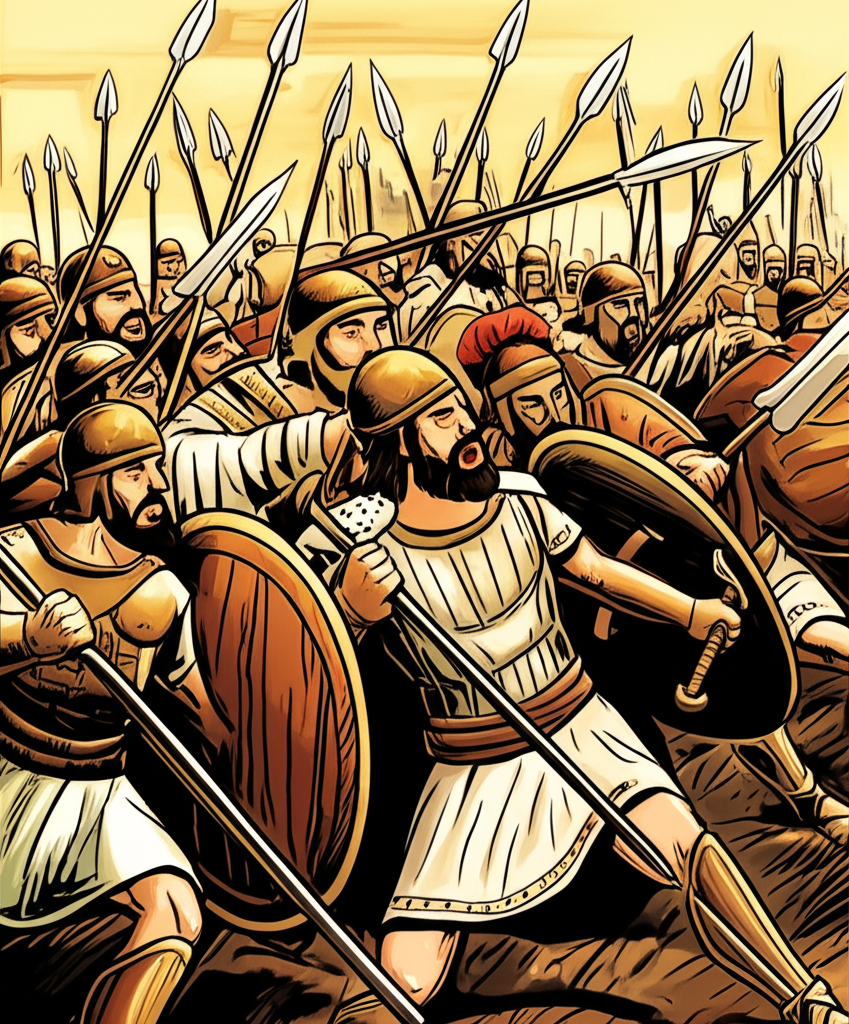
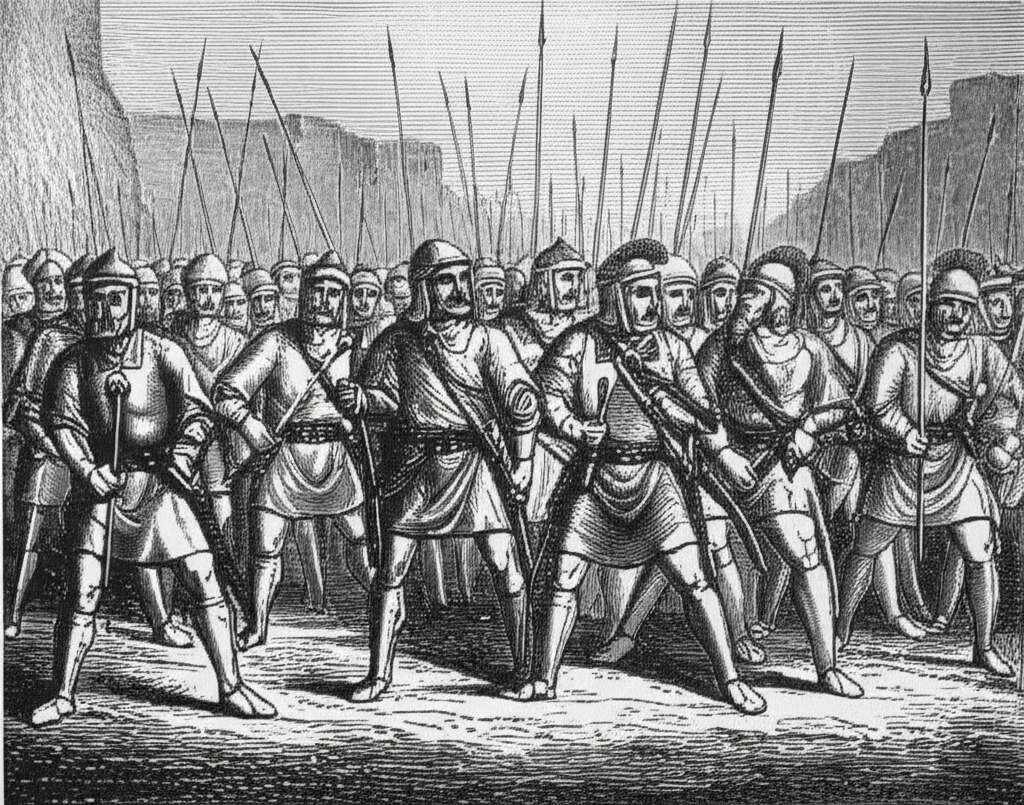
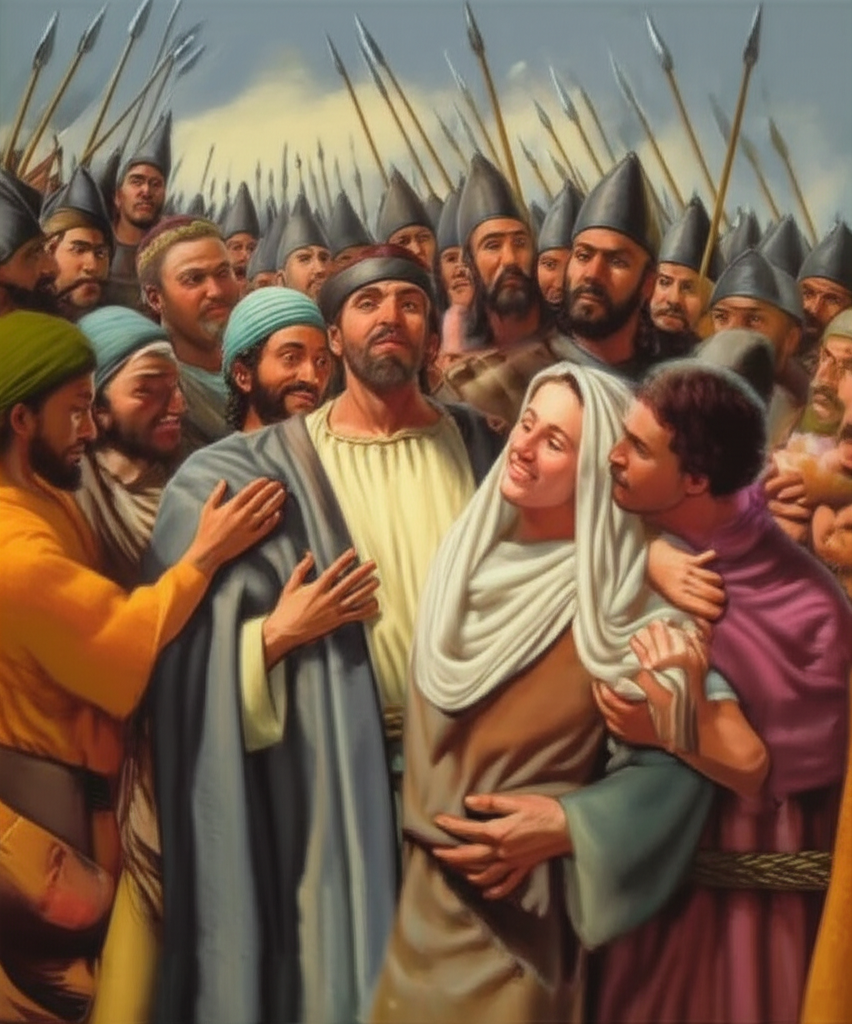

1 Samuel chapter 11 kjv
- 1 Then Nahash the Ammonite came up, and encamped against Jabeshgilead: and all the men of Jabesh said unto Nahash, Make a covenant with us, and we will serve thee.
- 2 And Nahash the Ammonite answered them, On this condition will I make a covenant with you, that I may thrust out all your right eyes, and lay it for a reproach upon all Israel.
- 3 And the elders of Jabesh said unto him, Give us seven days' respite, that we may send messengers unto all the coasts of Israel: and then, if there be no man to save us, we will come out to thee.
- 4 Then came the messengers to Gibeah of Saul, and told the tidings in the ears of the people: and all the people lifted up their voices, and wept.
- 5 And, behold, Saul came after the herd out of the field; and Saul said, What aileth the people that they weep? And they told him the tidings of the men of Jabesh.
- 6 And the Spirit of God came upon Saul when he heard those tidings, and his anger was kindled greatly.
- 7 And he took a yoke of oxen, and hewed them in pieces, and sent them throughout all the coasts of Israel by the hands of messengers, saying, Whosoever cometh not forth after Saul and after Samuel, so shall it be done unto his oxen. And the fear of the LORD fell on the people, and they came out with one consent.
- 8 And when he numbered them in Bezek, the children of Israel were three hundred thousand, and the men of Judah thirty thousand.
- 9 And they said unto the messengers that came, Thus shall ye say unto the men of Jabeshgilead, To morrow, by that time the sun be hot, ye shall have help. And the messengers came and showed it to the men of Jabesh; and they were glad.
- 10 Therefore the men of Jabesh said, To morrow we will come out unto you, and ye shall do with us all that seemeth good unto you.
- 11 And it was so on the morrow, that Saul put the people in three companies; and they came into the midst of the host in the morning watch, and slew the Ammonites until the heat of the day: and it came to pass, that they which remained were scattered, so that two of them were not left together.
- 12 And the people said unto Samuel, Who is he that said, Shall Saul reign over us? bring the men, that we may put them to death.
- 13 And Saul said, There shall not a man be put to death this day: for to day the LORD hath wrought salvation in Israel.
- 14 Then said Samuel to the people, Come, and let us go to Gilgal, and renew the kingdom there.
- 15 And all the people went to Gilgal; and there they made Saul king before the LORD in Gilgal; and there they sacrificed sacrifices of peace offerings before the LORD; and there Saul and all the men of Israel rejoiced greatly.
1 Samuel chapter 11 nkjv
- 1 Then Nahash the Ammonite came up and encamped against Jabesh Gilead; and all the men of Jabesh said to Nahash, "Make a covenant with us, and we will serve you."
- 2 And Nahash the Ammonite answered them, "On this condition I will make a covenant with you, that I may put out all your right eyes, and bring reproach on all Israel."
- 3 Then the elders of Jabesh said to him, "Hold off for seven days, that we may send messengers to all the territory of Israel. And then, if there is no one to save us, we will come out to you."
- 4 So the messengers came to Gibeah of Saul and told the news in the hearing of the people. And all the people lifted up their voices and wept.
- 5 Now there was Saul, coming behind the herd from the field; and Saul said, "What troubles the people, that they weep?" And they told him the words of the men of Jabesh.
- 6 Then the Spirit of God came upon Saul when he heard this news, and his anger was greatly aroused.
- 7 So he took a yoke of oxen and cut them in pieces, and sent them throughout all the territory of Israel by the hands of messengers, saying, "Whoever does not go out with Saul and Samuel to battle, so it shall be done to his oxen." And the fear of the LORD fell on the people, and they came out with one consent.
- 8 When he numbered them in Bezek, the children of Israel were three hundred thousand, and the men of Judah thirty thousand.
- 9 And they said to the messengers who came, "Thus you shall say to the men of Jabesh Gilead: 'Tomorrow, by the time the sun is hot, you shall have help.' " Then the messengers came and reported it to the men of Jabesh, and they were glad.
- 10 Therefore the men of Jabesh said, "Tomorrow we will come out to you, and you may do with us whatever seems good to you."
- 11 So it was, on the next day, that Saul put the people in three companies; and they came into the midst of the camp in the morning watch, and killed Ammonites until the heat of the day. And it happened that those who survived were scattered, so that no two of them were left together.
- 12 Then the people said to Samuel, "Who is he who said, 'Shall Saul reign over us?' Bring the men, that we may put them to death."
- 13 But Saul said, "Not a man shall be put to death this day, for today the LORD has accomplished salvation in Israel."
- 14 Then Samuel said to the people, "Come, let us go to Gilgal and renew the kingdom there."
- 15 So all the people went to Gilgal, and there they made Saul king before the LORD in Gilgal. There they made sacrifices of peace offerings before the LORD, and there Saul and all the men of Israel rejoiced greatly.
1 Samuel chapter 11 niv
- 1 Nahash the Ammonite went up and besieged Jabesh Gilead. And all the men of Jabesh said to him, "Make a treaty with us, and we will be subject to you."
- 2 But Nahash the Ammonite replied, "I will make a treaty with you only on the condition that I gouge out the right eye of every one of you and so bring disgrace on all Israel."
- 3 The elders of Jabesh said to him, "Give us seven days so we can send messengers throughout Israel; if no one comes to rescue us, we will surrender to you."
- 4 When the messengers came to Gibeah of Saul and reported these terms to the people, they all wept aloud.
- 5 Just then Saul was returning from the fields, behind his oxen, and he asked, "What is wrong with everyone? Why are they weeping?" Then they repeated to him what the men of Jabesh had said.
- 6 When Saul heard their words, the Spirit of God came powerfully upon him, and he burned with anger.
- 7 He took a pair of oxen, cut them into pieces, and sent the pieces by messengers throughout Israel, proclaiming, "This is what will be done to the oxen of anyone who does not follow Saul and Samuel." Then the terror of the LORD fell on the people, and they came out together as one.
- 8 When Saul mustered them at Bezek, the men of Israel numbered three hundred thousand and those of Judah thirty thousand.
- 9 They told the messengers who had come, "Say to the men of Jabesh Gilead, 'By the time the sun is hot tomorrow, you will be rescued.'?" When the messengers went and reported this to the men of Jabesh, they were elated.
- 10 They said to the Ammonites, "Tomorrow we will surrender to you, and you can do to us whatever you like."
- 11 The next day Saul separated his men into three divisions; during the last watch of the night they broke into the camp of the Ammonites and slaughtered them until the heat of the day. Those who survived were scattered, so that no two of them were left together.
- 12 The people then said to Samuel, "Who was it that asked, 'Shall Saul reign over us?' Turn these men over to us so that we may put them to death."
- 13 But Saul said, "No one will be put to death today, for this day the LORD has rescued Israel."
- 14 Then Samuel said to the people, "Come, let us go to Gilgal and there renew the kingship."
- 15 So all the people went to Gilgal and made Saul king in the presence of the LORD. There they sacrificed fellowship offerings before the LORD, and Saul and all the Israelites held a great celebration.
1 Samuel chapter 11 esv
- 1 Then Nahash the Ammonite went up and besieged Jabesh-gilead, and all the men of Jabesh said to Nahash, "Make a treaty with us, and we will serve you."
- 2 But Nahash the Ammonite said to them, "On this condition I will make a treaty with you, that I gouge out all your right eyes, and thus bring disgrace on all Israel."
- 3 The elders of Jabesh said to him, "Give us seven days' respite that we may send messengers through all the territory of Israel. Then, if there is no one to save us, we will give ourselves up to you."
- 4 When the messengers came to Gibeah of Saul, they reported the matter in the ears of the people, and all the people wept aloud.
- 5 Now, behold, Saul was coming from the field behind the oxen. And Saul said, "What is wrong with the people, that they are weeping?" So they told him the news of the men of Jabesh.
- 6 And the Spirit of God rushed upon Saul when he heard these words, and his anger was greatly kindled.
- 7 He took a yoke of oxen and cut them in pieces and sent them throughout all the territory of Israel by the hand of the messengers, saying, "Whoever does not come out after Saul and Samuel, so shall it be done to his oxen!" Then the dread of the LORD fell upon the people, and they came out as one man.
- 8 When he mustered them at Bezek, the people of Israel were three hundred thousand, and the men of Judah thirty thousand.
- 9 And they said to the messengers who had come, "Thus shall you say to the men of Jabesh-gilead: 'Tomorrow, by the time the sun is hot, you shall have salvation.'" When the messengers came and told the men of Jabesh, they were glad.
- 10 Therefore the men of Jabesh said, "Tomorrow we will give ourselves up to you, and you may do to us whatever seems good to you."
- 11 And the next day Saul put the people in three companies. And they came into the midst of the camp in the morning watch and struck down the Ammonites until the heat of the day. And those who survived were scattered, so that no two of them were left together.
- 12 Then the people said to Samuel, "Who is it that said, 'Shall Saul reign over us?' Bring the men, that we may put them to death."
- 13 But Saul said, "Not a man shall be put to death this day, for today the LORD has worked salvation in Israel."
- 14 Then Samuel said to the people, "Come, let us go to Gilgal and there renew the kingdom."
- 15 So all the people went to Gilgal, and there they made Saul king before the LORD in Gilgal. There they sacrificed peace offerings before the LORD, and there Saul and all the men of Israel rejoiced greatly.
1 Samuel chapter 11 nlt
- 1 About a month later, King Nahash of Ammon led his army against the Israelite town of Jabesh-gilead. But all the citizens of Jabesh asked for peace. "Make a treaty with us, and we will be your servants," they pleaded.
- 2 "All right," Nahash said, "but only on one condition. I will gouge out the right eye of every one of you as a disgrace to all Israel!"
- 3 "Give us seven days to send messengers throughout Israel!" replied the elders of Jabesh. "If no one comes to save us, we will agree to your terms."
- 4 When the messengers came to Gibeah of Saul and told the people about their plight, everyone broke into tears.
- 5 Saul had been plowing a field with his oxen, and when he returned to town, he asked, "What's the matter? Why is everyone crying?" So they told him about the message from Jabesh.
- 6 Then the Spirit of God came powerfully upon Saul, and he became very angry.
- 7 He took two oxen and cut them into pieces and sent the messengers to carry them throughout Israel with this message: "This is what will happen to the oxen of anyone who refuses to follow Saul and Samuel into battle!" And the LORD made the people afraid of Saul's anger, and all of them came out together as one.
- 8 When Saul mobilized them at Bezek, he found that there were 300,000 men from Israel and 30,000 men from Judah.
- 9 So Saul sent the messengers back to Jabesh-gilead to say, "We will rescue you by noontime tomorrow!" There was great joy throughout the town when that message arrived!
- 10 The men of Jabesh then told their enemies, "Tomorrow we will come out to you, and you can do to us whatever you wish."
- 11 But before dawn the next morning, Saul arrived, having divided his army into three detachments. He launched a surprise attack against the Ammonites and slaughtered them the whole morning. The remnant of their army was so badly scattered that no two of them were left together.
- 12 Then the people exclaimed to Samuel, "Now where are those men who said, 'Why should Saul rule over us?' Bring them here, and we will kill them!"
- 13 But Saul replied, "No one will be executed today, for today the LORD has rescued Israel!"
- 14 Then Samuel said to the people, "Come, let us all go to Gilgal to renew the kingdom."
- 15 So they all went to Gilgal, and in a solemn ceremony before the LORD they made Saul king. Then they offered peace offerings to the LORD, and Saul and all the Israelites were filled with joy.
- Bible Book of 1 Samuel
- 1 Story of Hannah
- 2 Hannah's song and Prayer
- 3 Story of Samuel
- 4 The Philistines Capture the Ark
- 5 The Philistines and the Ark
- 6 The Ark Returned to Israel
- 7 Samuel Judges Israel
- 8 Israel Asks for a King
- 9 Saul the first king of Israel
- 10 Samuel Anoints Saul as King
- 11 Saul Defeats the Ammonites
- 12 Samuel's Farewell Address
- 13 Saul Fights the Philistines
- 14 Story of Jonathan
- 15 Saul and the Amalekites
- 16 David annointed
- 17 David and Goliath story
- 18 David and Jonathan's Friendship
- 19 Saul Tries to Kill David
- 20 Jonathan Warns David
- 21 David and the Holy Bread
- 22 David in the cav of Adullam
- 23 David Saves the City of Keilah
- 24 David Spares Saul's Life
- 25 Death of Samuel and Abigail
- 26 David Spares Saul Again
- 27 David Flees to the Philistines
- 28 Saul consults the Witch of Endor
- 29 The Philistines Reject David
- 30 David's Wives Are Captured
- 31 Death of Saul